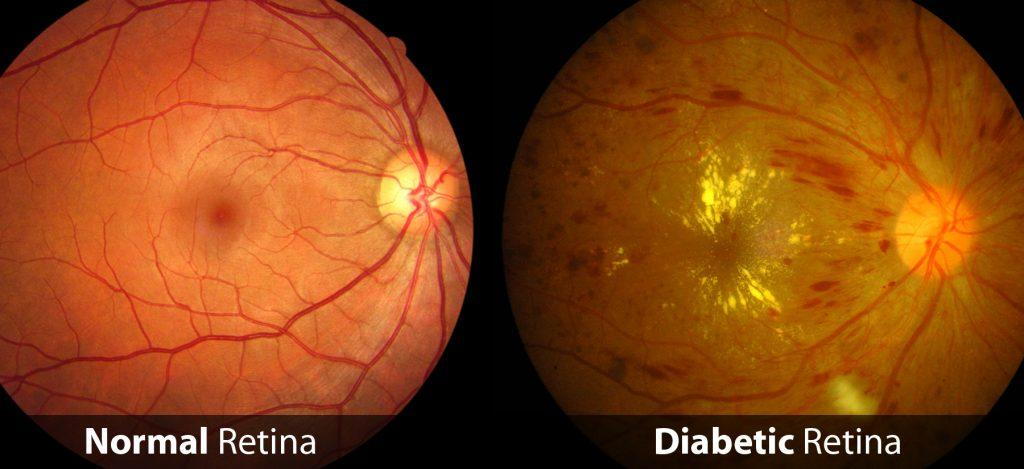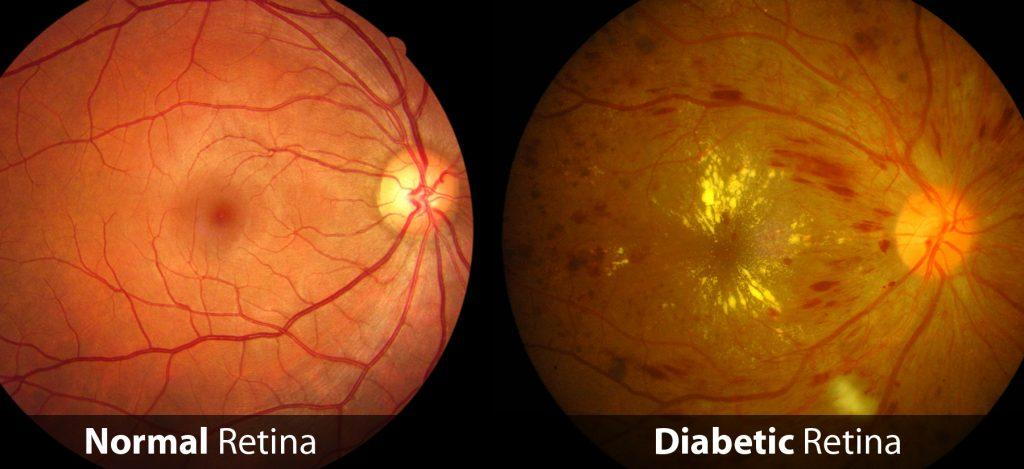
Mitchell Eye Care is happy to announce that on a consistent basis we will be writing an informative blog on various subjects related to eye health and vision. Check back with us every couple of weeks to see what is new and maybe learn a thing or two about your eyes!
Since November is Diabetes Awareness Month, it seems only fitting that our first blog should be about Diabetes. Throughout this blog, you will see not only how diabetes affects the eyes, but also that diabetes is the one of the fastest growing healthcare epidemics in the United States. The statistics are staggering.
Here are some statistics from the American Diabetes Association:
Prevalence: In 2015, 30.3 million Americans, or 9.4% of the population, had diabetes.
Approximately 1.25 million American children and adults have type 1 diabetes.
Undiagnosed: Of the 30.3 million adults with diabetes, 23.1 million were diagnosed, and 7.2 million were undiagnosed.
Prevalence in Seniors: The percentage of Americans age 65 and older remains high, at 25.2%, or 12.0 million seniors (diagnosed and undiagnosed).
New Cases: 1.5 million Americans are diagnosed with diabetes every year.
Prediabetes: In 2015, 84.1 million Americans age 18 and older had prediabetes.
Deaths: Diabetes remains the 7th leading cause of death in the United States in 2015, with 79,535 death certificates listing it as the underlying cause of death, and a total of 252,806 death certificates listing diabetes as an underlying or contributing cause of death.
So what actually happens to a patient who has diabetes? Well, let’s find out.
Diabetes results from the body’s inability to transport glucose (the “sugar” that is used to power our cells) from our blood to a target area of the body. The cells of our body process glucose to form energy that allows the cells to perform the rest of their duties. That is the case whether its a cell in the heart, the eye, the skin, or anywhere else in the body. Insulin created by the pancreas is responsible for transporting glucose out of the blood stream and into the body. This is where the main difference in Type 1 (insulin dependent) and Type 2 (insulin resistant) occurs. Type 1 diabetes is caused by the body’s own destruction of the cells in the pancreas which are responsible for insulin production. Without insulin, blood sugar rises and damage occurs. Type 1 diabetes usually occurs in younger patients and occurs based on an individuals genetics. Type 2 diabetes can occur following the inability of cells to recognize and respond to normal levels of insulin, to lower production of insulin as in type 1, or a combination of the two. Type 1 is typically treated with insulin. Type 2 diabetes can be controlled and/or prevented by proper diet and exercise but can also be treated with oral medication and/or insulin.
Now that we’ve discussed some of the types and causes of diabetes, we need to know how it affects the body and the negative health impacts that can occur. Diabetes affects blood vessels large and small. Increased blood sugar causes various changes with those blood vessels, including the breaking down/weakening of the blood vessel walls and causing blood vessels to contract leading to higher chance of high blood pressure and stroke. The weakened blood vessels will leak fluid (blood and it’s various components) into whatever organ they supply. If that fluid remains, it will damage the organ and tissue decreasing it’s function. That is why diabetes doesn’t just affect one area of the body. It affects the whole body at once. For this reason, it’s important to have your eyes checked even if you are seeing your best! Your primary care doctor will want you to get your eyes checked if you’ve been diagnosed with diabetes for two reasons: One they know your vision and eye health can be affected by diabetes, and two because the only blood vessels you can look at directly are in the eyes. If it’s affecting your eyes, then it’s affecting every part of your body and needs to be better controlled (medications changed, lifestyle changes, etc.)
Diabetes affects the eyes in various ways. I’ve had patients who did not know they were diabetic come in just because they weren’t seeing well. When I checked their glasses prescription it was night and day different from what they were wearing. Their increased blood sugar caused the natural lens on the inside of the eye to swell, which changed the prescription needed for correction. Once the blood sugar remained under control the swelling went down, and their old glasses were clear again. Other complications are not so easily fixed. One of the biggest complications is diabetic retinopathy. This is caused by fluid leaking from blood vessels into the retina (the inner lining of the eye). The retina senses light and turns it into a signal that can be interpreted by the brain. Damage to the retina can result in irreversible loss of sight.

Thankfully, Diabetic retinopathy will not cause a loss of vision over night. The loss is gradual, and at first the patient will not know anything is happening. That is why yearly eye exams are so important. An eye doctor can see those changes before a patient will notice them. The sooner you identify the problem, the easier it is to correct, and the less likely it is to cause lasting negative affects. Again, it’s also important to realize that the patient in the picture on the right above probably has other organs that look very similar to what you see in the eye. A friend of mine compares diabetes to trucks. If you have diabetes and you keep in under control, it’s like having a new truck. You change the oil, you rotate the tires, you change the brakes, and the truck lasts you for years. If your diabetes is not controlled, it’s like never servicing that truck and pulling a heavy trailer around everywhere you go. That truck isn’t going to last you nearly as long as the first one. You only get one body and one set of eyes (your trucks). Take care of them, and they will last you a lifetime!
